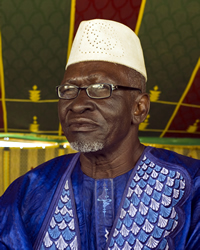Songhai, Koyra in Mali

Photo Source:
Wikimedia
Creative Commons
|
Send Joshua Project a map of this people group.
|
| People Name: | Songhai, Koyra |
| Country: | Mali |
| 10/40 Window: | Yes |
| Population: | 480,000 |
| World Population: | 480,000 |
| Primary Language: | Songhay, Koyra Chiini |
| Primary Religion: | Islam |
| Christian Adherents: | 0.20 % |
| Evangelicals: | 0.00 % |
| Scripture: | New Testament |
| Ministry Resources: | Yes |
| Jesus Film: | Yes |
| Audio Recordings: | Yes |
| People Cluster: | Songhai |
| Affinity Bloc: | Sub-Saharan Peoples |
| Progress Level: |
|
Introduction / History
The Songhai are known by various names. They trace their origins to the eighth century kingdom of Za. Islam was embraced as early as 1010, but it was mixed with their original beliefs in spirits of the river, soil, and wild game. The Za dynasty endured to the end of the sixteenth century, when it was conquered by the Sultan of Morocco. There are many Songhai subgroups, and one of the least known are the Koyra.
The Songhai are in the southern and eastern sections of Mali, mainly inhabiting the lush river plains from east of Lake Debo to the border of Niger. Other Songhai live in the desert, with little water and sparse vegetation. There are also sizable communities in Burkina Faso, Benin, Niger, and Nigeria.
What Are Their Lives Like?
An increasing number of rectangular mud-brick houses with corrugated-tin roofs are in their villages. Villages along the Niger River contain many rice fields and garden plots. Villages farther from the river are surrounded by bush areas and cultivated fields. Cowpeas, groundnuts, and manioc are the usual crops, but millet is grown from June to September during the brief rainy season. Farming the fields is considered noble labor and is for men only. The women have gardens in which they grow mangoes, guavas, citrus fruits, papayas, dates, and bananas during the hot, dry season. They also cultivate carrots, tomatoes, peppers, cabbages, and various types of squash. Most of the garden work is done by family members. In addition to farming, the Songhai also raise some livestock.
The village community is patrilineal; that is, all the men have a common male ancestor. Among Songhai nobles, firstborn sons are pressured to marry their paternal uncle's daughter to maintain the purity of the lineage. Men marry in their late twenties, whereas girls marry in their early teens. Whether the marriage bond lasts or not, children belong to the husband's lineage group. Although the Songhai value the Islamic right to have up to four wives, most men have only one, primarily for economic reasons. When there is more than one wife, each lives in her own separate dwelling within the household's compound.
What Are Their Beliefs?
The Songhai are almost all Sunni Muslim. Even though Islam introduced new elements to the Songhai culture, it left the underlying framework of custom and tradition virtually untouched. Islam is superficially important, as evidenced in the fact that every town has a mosque. Some communities have imams, who teach Islamic principles. The Koyra Songhai people often practice Muslim ceremonial activities. Marabouts (Islamic clerics) lead community prayers but are also used in healing the sick.
Spirit possession, magic, sorcery, ancestor worship, and witchcraft, however, remain the vital components of Songhai belief. Most of the villages have possession troops, magician-healers, and witches. Ceremonies of spirit possession occur at least once a week in some places. The most important of these are the genji bi hori (a festival in which the Songhai make offerings to the "black spirits" believed to control pestilence) and the yenaandi (rain dance). Both ceremonies are held in the dry season.
What Are Their Needs?
Generally, the Songhai peoples live simple but adequate lives, except in times of drought. Unfortunately, these occur regularly and have left many children as orphans in refugee camps along the Niger River. Malnutrition is a problem for many of them.
A majority of the Koyra Songhai have never heard a clear presentation of the gospel. Christian workers who can share the love of Jesus in practical ways are urgently needed to reach them.
Prayer Points
Ask the Lord to send Christian agricultural workers, educators, and doctors to minister to the Koyra Songhai people of Mali.
Ask the Holy Spirit to grant wisdom to the mission agencies that are focusing on the Songhai peoples.
Ask the Lord to save key leaders among the Koyra Songhai who will boldly proclaim the gospel.
Pray that God will strengthen, embolden, and protect Songhai believers. Pray that they will lovingly share their Savior with others.
Pray for a victorious Koyra Songhai church that is defined by love, service to Christ, and discipleship.